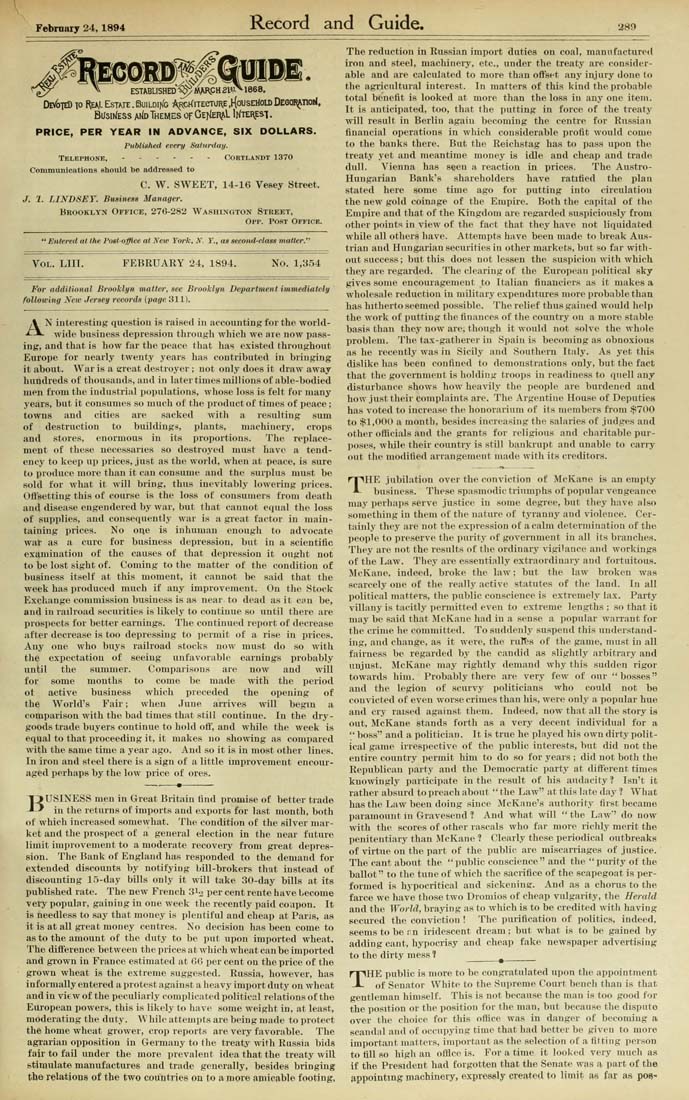Columbia University Libraries Digital Collections: The Real Estate Record
Use your browser's Print function to print these pages.
Real estate record and builders' guide: v. 53, no. 1354: February 24, 1894

Text version:
Please note: this text may be incomplete. For more information about this OCR, view About OCR text.
Febrnary 24,1894 Record and Guide. 289 ESTABLISHED-^ fl\M^.CH 2li!> 1868, Dev&teD to Real Eswe . BuiLoif/c AR-crfiTECT^iRE .KousEifou) DEGcmjTiod, Bi/siiIess Atfo Themes OFGEffei^^ IKtef^esi. PRICE, PER YEAR IN ADVANCE, SIX DOLLARS. Published every Saturday. Telephone,......Cortlandt 1370 Communioationa shoidd be addressed to C. W. SWEET, 14-16 Vesey Street. J. 1. LINDSEY. Bus'mess Manager. Brookly.n Office, 276-282 Washington Street, Opp. Post Office. " Entered at the Post-offlce al New Tork, N. T., as second-class matter." Vol. LIII. FEBRUARY 24, 1894. No. 1,354 For additional Brooklyn matter, see Brooklyn Department immediately following New Jersey records {page 311). AN interesting question is raised in accounting for the world¬ wide bu.sines.s depression tbrough which we are now pa8.s- ing, and th:it is how far the peace that has existed throughout Europe for nearly twenty years has contributed in bringing it about. War is a great destroyer ; not only does it draw away hundreds of thousands, and in biter times millions of able-bodied men from the industrial populations, whose loss is felt for many years, but it consitines so much of the product of times of peace; towns and cities are sacked with a resulting sum of destruction to buildings, plants, machinery, crops and stores, enormous in its proportions. The replace¬ ment of these necessaries so destroyed must have a tend¬ ency to keep up prices, .iust as the world, when at pe;ice, is sure to produce more than it can consume and the surplus must be sold for what it will bring, thus inevitably lowering prices. Offsetting thia of course is the loss of consumers from death and disease engendered by war, but that cauuot eiiiial the loss of supplies, and conseiinently war is a great factor in main¬ taining prices. No oue is inhuman enough to advocate war as a cure for business depression, but in a scientific examination of the causes of that depression it ought not to be lost sight of. Coming to the matter of the condition of business itself at this moment, it cannot be said that the week has produced much if any improvement. On tlie Stock Exchange commission business is as near to dead as it c.in be, and iu railroad securities is likely to continue so until there are Iirospects for better earnings. The continued report of decrease after decrease is too depressing to permit of a rise in prices. Any one who buys railroad stocks uow must do so with the expectation of seeing unfavorable earnings probably until the summer. Comparisons are now and will for some mouths to come be made with the period ot active business which preceded the opening of the World's Fair; when Juue arrives will begin a comparison with the b.ad times that still continue. In the dry- goods trade buyers continue to hold oft', and while the week is equal to that proceeding it, it makes no showing as compared with the same time a year ago. And so it is in most other lines. In iron and steel there is a sign of a little improvement encour¬ aged perhaps by the low price of ores. BUSINESS men in Great Britain find promise of better trade iu the returns of imports and exports for last month, both of which increasetl .somewhat. The condition of the silver mar¬ ket and the prospect of a general election in the near future limit improvement to a moderate recovery from great depres¬ sion. The Bank of England has responded to the demand for extended discounts by notifying bill-brokers that instead of discounting 1.5-day bills only it will take 30-day bills